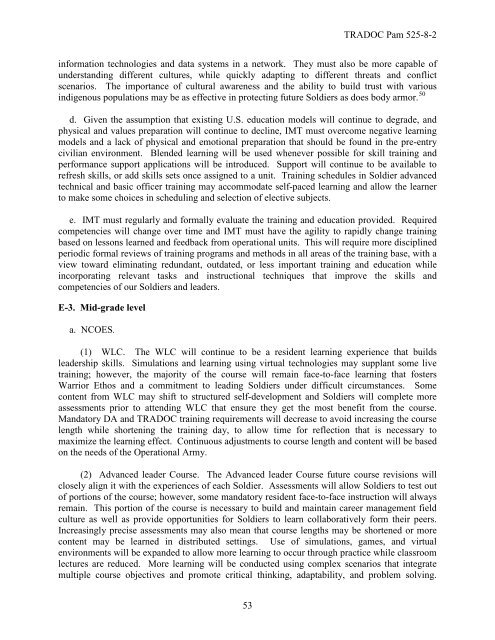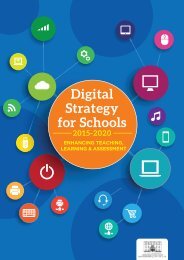K3zgZ
K3zgZ
K3zgZ
Create successful ePaper yourself
Turn your PDF publications into a flip-book with our unique Google optimized e-Paper software.
TRADOC Pam 525-8-2<br />
information technologies and data systems in a network. They must also be more capable of<br />
understanding different cultures, while quickly adapting to different threats and conflict<br />
scenarios. The importance of cultural awareness and the ability to build trust with various<br />
indigenous populations may be as effective in protecting future Soldiers as does body armor. 50<br />
d. Given the assumption that existing U.S. education models will continue to degrade, and<br />
physical and values preparation will continue to decline, IMT must overcome negative learning<br />
models and a lack of physical and emotional preparation that should be found in the pre-entry<br />
civilian environment. Blended learning will be used whenever possible for skill training and<br />
performance support applications will be introduced. Support will continue to be available to<br />
refresh skills, or add skills sets once assigned to a unit. Training schedules in Soldier advanced<br />
technical and basic officer training may accommodate self-paced learning and allow the learner<br />
to make some choices in scheduling and selection of elective subjects.<br />
e. IMT must regularly and formally evaluate the training and education provided. Required<br />
competencies will change over time and IMT must have the agility to rapidly change training<br />
based on lessons learned and feedback from operational units. This will require more disciplined<br />
periodic formal reviews of training programs and methods in all areas of the training base, with a<br />
view toward eliminating redundant, outdated, or less important training and education while<br />
incorporating relevant tasks and instructional techniques that improve the skills and<br />
competencies of our Soldiers and leaders.<br />
E-3. Mid-grade level<br />
a. NCOES.<br />
(1) WLC. The WLC will continue to be a resident learning experience that builds<br />
leadership skills. Simulations and learning using virtual technologies may supplant some live<br />
training; however, the majority of the course will remain face-to-face learning that fosters<br />
Warrior Ethos and a commitment to leading Soldiers under difficult circumstances. Some<br />
content from WLC may shift to structured self-development and Soldiers will complete more<br />
assessments prior to attending WLC that ensure they get the most benefit from the course.<br />
Mandatory DA and TRADOC training requirements will decrease to avoid increasing the course<br />
length while shortening the training day, to allow time for reflection that is necessary to<br />
maximize the learning effect. Continuous adjustments to course length and content will be based<br />
on the needs of the Operational Army.<br />
(2) Advanced leader Course. The Advanced leader Course future course revisions will<br />
closely align it with the experiences of each Soldier. Assessments will allow Soldiers to test out<br />
of portions of the course; however, some mandatory resident face-to-face instruction will always<br />
remain. This portion of the course is necessary to build and maintain career management field<br />
culture as well as provide opportunities for Soldiers to learn collaboratively form their peers.<br />
Increasingly precise assessments may also mean that course lengths may be shortened or more<br />
content may be learned in distributed settings. Use of simulations, games, and virtual<br />
environments will be expanded to allow more learning to occur through practice while classroom<br />
lectures are reduced. More learning will be conducted using complex scenarios that integrate<br />
multiple course objectives and promote critical thinking, adaptability, and problem solving.<br />
53




